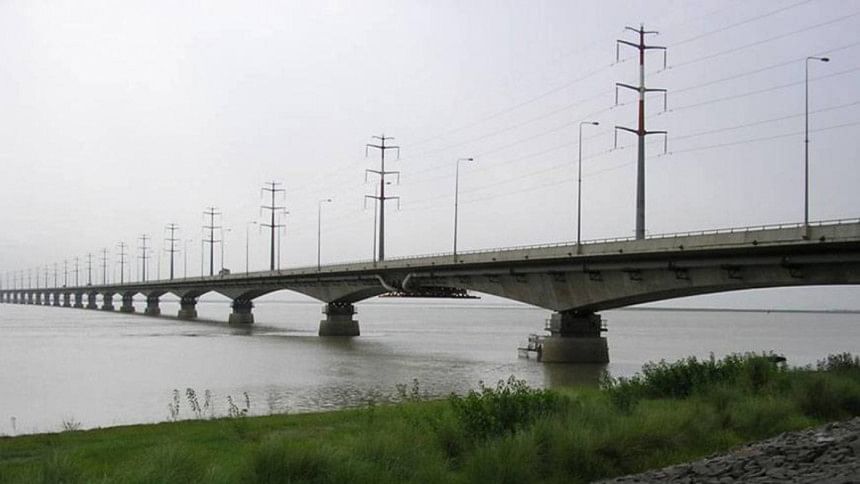Bangabandhu, Mukterpur Bridges: Toll rates raised

The government has raised the toll rates of the country's two biggest bridges -- Bangabandhu Bridge and Mukterpur Bridge -- by 10 to 50 percent.
At Bangabandhu Bridge, the rates for passenger vehicles like cars and buses rose by 10 to 25 percent while it went up by 14 to 18 percent for trucks and trailers.
At Mukterpur Bridge in Munshiganj, the rates have been hiked by 25-50 percent and 20-33 percent respectively.
The authorities have also for the first time fixed toll rates for three-axle trucks and trailers.
The Bridges Division yesterday issued a circular on the hiked rates, saying the new rates came into effect immediately.
Contacted, Bridges Division Secretary Abu Bakr Siddique said the authorities concerned were updating the relevant software. He hoped that they would be able to implement the new rates within a day or two.
He said the toll rates for Bangabandhu Bridge have been increased by 17 percent on average. The rates for Mukterpur Bridge saw a similar hike.
The development came four months after the Bangladesh Bridge Authority (BBA), which built and operates the bridges, decided to raise the toll rates to boost the income from the bridges. With the money, the government wants to pay for the maintenance of the bridges and repay the loans it took to build those.
The BBA board, chaired by Road Transport and Bridges Minister Obaidul Quader, made the decision at its 110th meeting on June 24 this year, officials said.
The toll rates of Bangabandhu Bridge were last raised in 2011. This is the first time the rates of Mukterpur Bridge have been increased since its inauguration in 2008.
Transport leaders, however, said they had not been informed about the government decision and that the decision would ultimately put an additional burden on passengers.
It is because with the new rates, rent of vehicles will go up, they said.
The 4.8-kilometre Bangabandhu Bridge, which was opened to traffic in 1998, on the Jamuna river is a vital strategic economic road, rail, energy, and telecommunication link between the western and eastern parts of the country.
The project was implemented at a cost of Tk 3,745 crore.
Quader on June 6 told parliament that Tk 6,434 crore has been collected in toll money from vehicles using the bridge till May this year.
In his scripted answer to a question from an MP, the minister said Tk 4,104.21 crore was spent in operational and maintenance costs and also for payment of DSL (debt service liability) of the bridge during that period.
The loan taken from development partners for the construction of the bridge would be repaid by 2034, he added.
As per the new rates, the toll for a motorcycle crossing Bangabandhu Bridge is Tk 50, a car Tk 550, a microbus and a pickup Tk 600, a minibus Tk 750, a bus Tk 1,000, a small truck (up to 5 tonnes) Tk 1,000, a medium truck (5 and 8 tonnes) Tk 1,250 and a large truck (8 to 11 tonnes) Tk 1,600.
A three-axle truck has to give Tk 2,000 and a 4-axle trailer has to pay Tk 3,000. An additional Tk 1,000 will be charged for each axle above four. There was no mention of this category in the previous toll rates.
Besides, Bangladesh Railway will have to pay Tk 1 crore annually for using the bridge. It was Tk 50 lakh earlier.
The BBA opened the 1.52km Mukterpur Bridge over the Daleshwari river in 2008. The bridge was built under a Tk 208.35 crore project to connect Munshiganj with Dhaka and Narayanganj.
As per the new decision, a motorcycle will pay Tk 15, an auto-rickshaw Tk 30, a car Tk 50, a jeep, microbus, pick up Tk 50, a minibus Tk 150, a bus Tk 250, a small truck (up to 5 tonnes) Tk 200, a medium truck (5 and 8 tonnes) Tk 250 and a large truck (8 to 11 tonnes) Tk 600 for using the structure.
Khondaker Enayet Ullah, secretary general of Bangladesh Road Transport Owners Association, said they were not aware of any move regarding hiking the toll rates.
Rustam Ali Khan, general secretary of Bangladesh Truck-Covered-Van Owners Association, said if the operational costs of vehicles go up, the fares of trucks and covered vans will rise as well.
Once the vehicles' fares rise, the people will ultimately have to bear the brunt, he told The Daily Star yesterday.
When the transport sector has been recouping losses induced by the pandemic, such a decision will put an extra burden on it, he added.
He urged the government to reconsider the decision and postpone the implementation of the new rates.
As his attention was drawn to the matter, Bridges Division Secretary Abu Bakr Siddique said they depend on toll revenues to pay for the bridges' maintenance costs and repay loan money taken for the construction of the structures. They also have to collect funds for new projects.
Replying to a question, he said, "Yes, it will put pressure on the people. But we also have to bear the pressure."

 For all latest news, follow The Daily Star's Google News channel.
For all latest news, follow The Daily Star's Google News channel. 



Comments